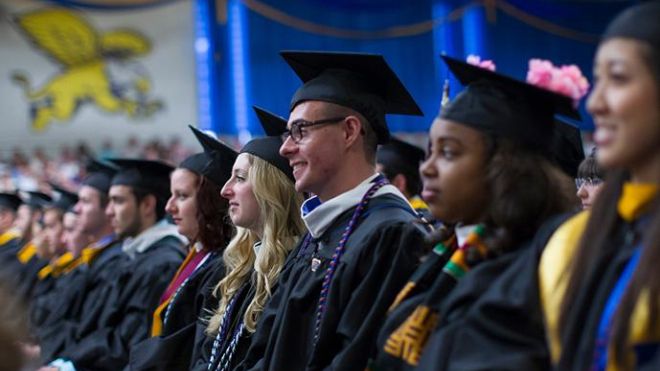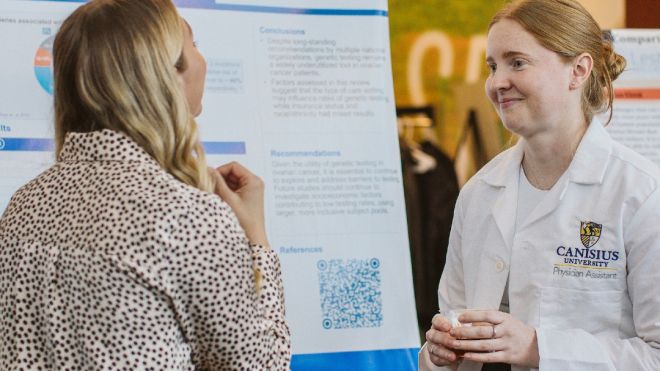BUFFALO, NY - Michael Gzyl ’11 first learned the art of pickling when he was five years old. It was a summer pastime, passed down to him by his great grandmotherand father, whose Polish recipes for garlic dill and sweet bread-and-butter pickles were favorites among friends. Gzyl still pickles each season. Only now, he’s not just preserving a family tradition. He’s made it his business.
Gzyl is the founder and owner of Susie Cuke’s Pickles. The company is rooted in Grandma Gzyl’s century-old pickle recipes. However, the seeds for Susie Cuke’s were sown during Gzyl’s years in the Entrepreneurship Program at Canisius.
“By the time I graduated, I had my business plan in place, a positioning statement and logo, a targeted market (Buffalo’s Polish community and farmers’ markets), and a great network of professors and mentors who believed in me and my product,” says Gzyl. “I guess I shouldn’t have been surprised then when I sold out of pickles on my first day but I was!”
It takes guts and a whole lot of hard work to turn a great idea into a sustainable business venture. Nevertheless, entrepreneurship is fast becoming a viable career option for today’s enterprising college students: It’s the third most popular major (after neuroscience and bioengineering), according to a national study by the research and consulting firm Millennial Branding. Here at Canisius, the entrepreneurship major saw a nearly 300 percent increase in enrollment over the past eight years.
“To some extent, this generation may see entrepreneurship as a way to protect itself against a shrinking job market,” explains Gregory R. Wood, PhD, associate dean for the Wehle School of Business. “More likely, today’s students have grown up watching entrepreneurship become a huge and profitable part of pop culture. Facebook, YouTube, Twitter and Instagram are all successful start-ups launched by relatively young people,” adds Wood.
Canisius has been an incubator for entrepreneurs ever since Alan G. Weinstein, PhD, taught the first entrepreneurship course at the MBA level in 1982. Back then, his class roster included Nancy Ware ’78, MBA ’85, owner of the childcare and kindergarten readiness centers EduKids Inc.; Andrew Shaevel ’88, MBA ’90, who launched Remarketing Services of America (RSA), which managed the sale and resale of off-lease vehicles; and Michael Newman ’90, MBA ’95, executive vice president of the family-owned NOCO energy company.
Now, these seasoned entrepreneurs and others of their ilk share their formulas for success with Canisius’ next generation of start-ups. They call themselves Entrepreneurs on Campus (EOC) and the group is helping to further differentiate Canisius as a leader in entrepreneurship education.
“Ultimately, our job is to support entrepreneurship students in getting their businesses off the ground,” says Nancy Ware, chair of the EOC.
That support comes in many different forms.
EOC members are professors, financial advisors, mentors and friends to students. Their work with undergraduates begins where every entrepreneurial venture originates: with a good idea.
“Students have some really enthusiastic ideas but often forget to consider the value proposition – or - why a consumer should buy their product or use their service,” explains Stuart Angert, EOC member and co-founder of RSA. “I remind students that any entrepreneurial idea has to save consumers time or money or make them money.”
It also has to be supported by a sound business plan.
Considered the ‘road map’ for any new venture, the business plan outlines everything from resources to revenue projections and marketing plans to management expectations.
It took Alex ’13 and William ’13 Severyn nearly an entire semester to write the 40-page business plan for their start-up, Ambitious Enterprises Inc. (The real estate investment firm helps homeowners who are in distressed situations or who need to sell their homes quickly.) When they finished, the EOC “reviewed it, ripped it apart and worked with us to rebuild it and perfect it,” says Alex. Their final business plan “ultimately helped us secure nearly $700,000 in private investments within five months of graduating,” adds William.
The EOC put the Severyns in touch with many of their investors. But members provide financial assistance of their own. Upon joining the EOC, participants agree to serve three-year terms and contribute $2,000 in dues each year. These contributions enable Canisius to build upon its already mighty entrepreneur program.
There are now 10 courses in the major, compared to three, less than a decade ago. In addition to traditional management, marketing and finance studies, new courses emphasize creativity, innovation, interpersonal skills and entrepreneurial leadership.
“These are universal business skills that students can apply anywhere in whatever field they choose to pursue,” says Ji-Hee Kim, PhD, director of the entrepreneurship program.
Real-world experience is also engrained in an entrepreneurial education at Canisius. Students act as consultants for small businesses. Under the guidance of faculty, they work on projects for and advise practicing entrepreneurs.
Outside class, undergraduates manage MyLinkFace, a student-run social venture that uses multimedia technology to teach foreign-speaking individuals how to master the English language (Canisius Magazine, spring 2011). The CanDo Society pairs entrepreneurship students with local chief executives, who provide students with practical work experiences within the various departments in their organizations.
“One of the reasons I transferred to Canisius for entrepreneurship was because of all the exposure I’d get to real entrepreneurs and real-world entrepreneurship practices,” says Samuel Garofano ’14.
Garofano is president of the Canisius chapter of the Collegiate Entrepreneurs Organization (CEO). The club develops and implements experiential entrepreneurship projects, which students then test at on-campus elevator pitch and business plan competitions. EOC members serve as judges.
The front-runners then compete at the national CEO conference. Since 2007, the Canisius team has taken home multiple Best Chapter awards in the categories of marketing plans and teaching entrepreneurship. Ji-Hee Kim is a three-time recipient of the Best Chapter Advisor Award.
“Books can only teach so much and Dr. Kim knows that,” says Gzyl. “She’s developed a program around the idea that students apply their knowledge from the textbook to actual business ventures. Whether those ventures succeed or fail, students still gain experience from the application.”
Failure is actually built in to the curriculum.
“Entrepreneurship is a curly profession,” says Weinstein, who established the EOC. “There’s no straight line to success and there’s no job security. We want to make sure students understand this before they graduate.”
To underscore the point, members of the EOC share their bootstrap stories with students in the program’s capstone course. Their stories often include tales of rejection, false starts and white-knuckle moments.
James Cipriani Jr. ’87 talks about the many failures he endured before finally getting his executive recruiting and placement agency, Systems Personnel, off the ground.
Jim Kessler ’87 shares accounts of the technological and financial roadblocks he hit prior to enlisting the help of Alan Weinstein to open the laser tag and entertainment center Lasertron.
Stuart Angert and Andy Shaevel recall how they “sweat bullets for 18 months,” waiting for RSA to break even.
“There’s no textbook that can teach the lessons of courage, ambition and perseverance that I learned in those classes,” says William Severyn. His brother, Alex, adds, “All the entrepreneurs who spoke found their successes in Buffalo, which is exactly what we are trying to do, and that just makes our vision seem all the more attainable.”
Perhaps sooner than expected.
Western New York is in the midst of a renaissance and Canisius’ promising entrepreneurs can be another catalyst for the region’s resurgence. Entrepreneurs create jobs. Jobs create wealth. Wealth supports the infrastructure that brings new products and ideas to market and ultimately makes for a more vibrant community.
“Canisius is a platform for the next class of opportunity takers and value makers in this community and if they succeed, everyone succeeds - the college, the city, the region and New York State,” says Ware.
Something to chew on the next time you pick up a jar of Susie Cuke’s pickles at your local farmer’s market. Just remember where the seeds for that great business were cultivated.



